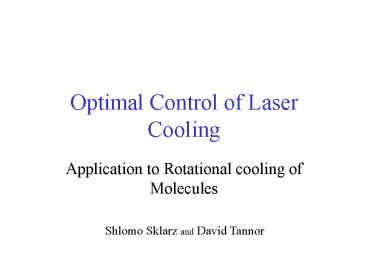Optimal Control of Laser Cooling - PowerPoint PPT Presentation
1 / 12
Title:
Optimal Control of Laser Cooling
Description:
Purity changing Motion is slow and determined by dissipation ... 3.Definition of laser cooling in terms of Purity and a maximum cooling rate found. ... – PowerPoint PPT presentation
Number of Views:121
Avg rating:3.0/5.0
Title: Optimal Control of Laser Cooling
1
Optimal Control of Laser Cooling
- Application to Rotational cooling of Molecules
Shlomo Sklarz and David Tannor
2
Optimal Control Theory (OCT)Applications to
Quantum Systems
1) Control of Chemical Bond Breaking,
Ionization, etc. 2) High Harmonic Generation. 3)
Quantum Computations. Hamiltonian Cont
rollable Fast No Cooling
3
Cooling as increase of Purity Tr(?2)
- Physical Interpretation 1) Average Phase
space density 2) Gives weight to both
populations coherences. - 3) Plays role of Entropy.
- Mathematical properties
4
Rotational Manifold Cooling
1) Truncated model. 9-level 2) Goal Populate
ground j0 level. 3) Optimization Krotov
method 4) CW does not work. Saturation of
purity at 1/3 or 1/2.
t
We Show in the following that 349
5
3-level results
High resolution Low
resolution polarization resolution frequency
resolution
Dark State Purity Accumulation. dark? 1?-
2?, light? 1? 2?
6
4-level results Dealing with 2 dark states
4?
?
-?
z?
3?
2?
1?
Polarization Alternation- avoids unwanted Dark
state trapping.
7
9-level Optimization results
349 1) Alternation of field polarizations xy
z.(Corresponds to ? ?- alternation.)
(4) 2) Non Monotonic increase in Population.
Monotonic increase in Purity. (3) 3) Bound
on rate of purity increase.
8
9925
25-level system
J3 j1
egt
J4 j2 j0
ggt
1) Multi staged process a) Two frequencies
play role.b) different rates for each process.
c) Last stage, j2?j0, is the bottle neck. 2)
Field polarizations alternate.
9
Maximal Cooling Rate (3rd law)
- Definitions
- nt number of target states
- nr other participating states.
- ??? sum of spontaneous emission rates into
target.
- Assumptions
- Populations are evenly and non coherently
distributed between states.
nt Target states
Maximum Cooling Rate (3rd Law)
10
Controllability
Definition A system is completely controllable
if any Kinematically admissible target state can
be dynamically reached from the initial state.
- Hamiltonian
- Controllable if the Lie Algebra L generated by
iH0, iHj is of order N2 and thus spans the
entire space of unitary transformations, U(N).
V. Ramakrishna et al Phys. Rev. A, 51 960
(1995)
11
Analytical formulation of Optimal Cooling
- G- Liouville group
- K- subgroup generated by the control
Hamiltonians, assumed to be the whole unitary
group U(N). - Hamiltonian Motion is fast and governed by the
controls - Purity changing Motion is slow and determined by
dissipation
- Geometrical principals N. Khaneja et al Phys.
Rev. A, 63 (2001) 032308. - G-unitary group
- K-subgroup generated by the control Hamiltonians,
Kexp(HjLA). - G/K quotient space where each point represents
some coset KU. - Motion within a coset is fast and governed by the
controls - Motion between cosets is slow and determined by
H0.
1
- The problem reduces to finding the fastest way to
get between cosets in G/K space
12
Summary
1. Possibility of laser cooling rotational
degrees of molecules. 2. Framework for analyzing
and comparing laser cooling schemes. 3.Definition
of laser cooling in terms of Purity and a
maximum cooling rate found. (3rd law) 4.
Controllability in dissipative systems.































